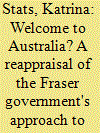| Srl | Item |
| 1 |
ID:
138156


|
|
|
|
|
| Summary/Abstract |
Malcolm Fraser's book Dangerous Allies (Fraser with Roberts 2014) has rightly been taken to task, even by broadly sympathetic readers, for the way it caricatures US foreign policy (White 2014). It leaves the absurd impression that almost everything Washington does in the world today is a wilfully dangerous extension of the neoconservative crusade of a decade ago. The book has at least one other equally unsettling flaw: the way it misreads or misrepresents contemporary Asia. The author privileges his own version of China's strategic priorities and sensitivities far above the interests and perspectives of other Asian countries. This lack of balance, combined with a false depiction of the USA, greatly weakens the credibility of the book's core conclusions about revisiting and perhaps ending the security alliance between the USA and Australia.
|
|
|
|
|
|
|
|
|
|
|
|
|
|
|
|
| 2 |
ID:
138161


|
|
|
|
|
| Summary/Abstract |
The Fraser government's response to the Indo-Chinese refugee crisis and the presentation, for the first time, of asylum-seekers arriving in Australia by boat is almost universally acclaimed as having been proactive, generous and humanitarian in spirit—the antithesis of both the preceding Whitlam Labor government and subsequent governments, particularly since 2001. Adopting a policy of ‘forward selection’ of refugees from camps in South-East Asia, the Fraser government was able to stem the flow of boats and oversaw the relatively uncontroversial resettlement of nearly 70,000 Indo-Chinese. However, the author argues that this was not the brave and principled course of action for which Fraser and his immigration ministers are regularly fêted, but rather a delayed response that was motivated by fear and desperation rather than pure humanitarian intent. The celebrated outcomes of Fraser's policies belie the self-interested way in which they were constructed and neglect the fact that the government did not act until it was forced. Fraser's policies were neither a departure from the past nor the antithesis of current polices; to the contrary, they were the seeds of the contemporary Australian model of asylum.
|
|
|
|
|
|
|
|
|
|
|
|
|
|
|
|